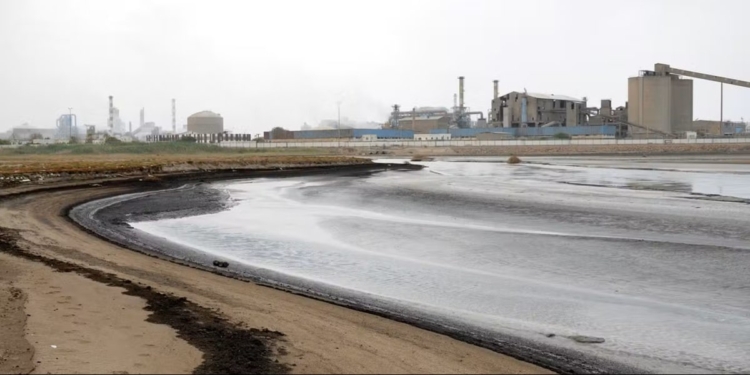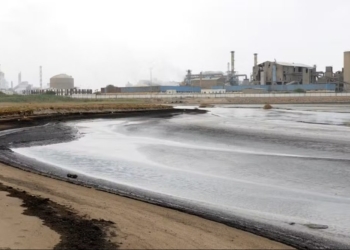The ecological crisis in Gabès is reaching a breaking point. While the city observed a historic general strike against pollution from the Tunisian Chemical Group (GCT), industrial environment expert Samir Kazbar issues an ultimatum: stop the dumping of phosphogypsum and the Mediterranean Sea could “recover its health in a year”.
The phrase resonates as a fragile promise in a region where hope has long mixed with anger, but it gives a clear purpose to the protest movement.
The overwhelming figures for phosphogypsum: 200 million tonnes dumped
Between Essalem beach and Ghannouch, the seabed is covered with acidic mud. This toxic byproduct comes from the processing of phosphate by GCT.
Nearly 200 million tonnes have been spilled since the creation of the industrial complex. Every day, an additional 15,000 tonnes reach the sea, transforming the former coastal oasis into a red zone.
According to expert Kazbar, even if a complete cleanup would require two to three years of dredging, “if the discharges stopped, the sea would regenerate itself in a year,” he assures.
The radical appeal: The dismantling of the GCT, the only serious remedy
Faced with the scale of the disaster, and storage on land deemed unrealistic, Kazbar points out the only viable solution:
“The only serious remedy to the ecological drama of Gabès is the pure and simple dismantling of the GCT’s polluting units,” says the expert, denouncing outdated, non-compliant installations rejected by the population.
Gabès: A historic general strike brings the industry to a standstill
These comments come at the heart of an exceptional mobilization. The city of Gabès observed a total regional general strike this Tuesday, followed by a peaceful march starting from Aïn Essalem Square.
The mobilization was a resounding success: businesses closed, taxis immobilized, with banners brandished by mobilized citizens: “The people want the dismantling of the units”.
According to Ahmed Chelbi, president of the regional section of the Tunisian League for Human Rights (LTDH), the mobilization was “100% successful”.
Also read: Gabès angry: human tide against the pollution of the chemical complex
The political shockwave: “Environmental crimes” in the viewfinder
The hope of residents was revived a few days ago by the declarations of President Kaïs Saïed, who spoke of “environmental crimes” committed in the name of profit and impunity.
These words were seen as a strong signal by the inhabitants of Gabès, who now hope to see these words transformed into concrete actions: stopping discharges, cleaning the sea and making the air breathable.
Between a dying sea and an industry that is hanging on, Gabès finds itself at a crossroads: that of a region which could, in a year, become alive again – if only we let it heal.
Also read: From Carthage, Kaïs Saïed salutes “the exemplary conscience” of the people of Gabès





